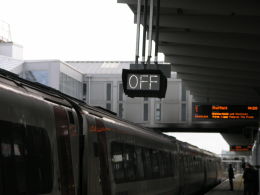Posted 25th March 2010 | 3 Comments
Network Rail warns of 'severe impact' as strike dates are announced

THE RMT union has announced four days of signallers' strikes immediately after Easter. Members of the TSSA will also walk out. The action, in a dispute over flexible rostering, will have a 'severe impact' according to Network Rail, although the company said as many trains as possible would still be run. The RMT said it had worked 'flat-out' in a bid to reach an agreement.
The strikes will be held from 6-9 April, and will occur twice a day, between 06.00-10.00 and 18.00-22.00. Walkouts by signallers during these periods threaten to cripple peak hour commuter services in London and other large cities, unless Network Rail can provide emergency cover. Many intercity and rural services will also be disrupted.
A further problem will affect routes with locally controlled level crossings: it is unlikely that NR will be able to provide relief staff to the boxes concerned, and all train services along such routes will have to stop during the walkouts.
The announcement of the strike dates followed several tense days of talks at the conciliation service ACAS between Network Rail, the RMT and TSSA. A few hours before the dates were announced, Network Rail had said the discussions were making 'promising' progress.
RMT general secretary Bob Crow said: "RMT negotiators have worked flat-out to try and reach an agreement that protects rail safety, job security and working agreements in the disputes involving signalling and maintenance staff on Britain's railways. Despite long hours of talks, we have received nothing concrete from Network Rail that addresses the key issues."
TSSA general secretary Gerry Doherty said the strike was all about "the safety of the travelling public and the safety and security of our members".
Network Rail's director of operations and customer services Robin Gisby sees the strikes as a backward step. He said: "Passengers want more trains - starting earlier and running later - with fewer buses and more trains at weekends. To achieve this Network Rail needs to change the way the railway works. We want proper discussions with the unions' leadership about implementing changes. Negotiations, not strikes are the way forward.
"This proposed strike is not about safety. Britain’s railway is safer than ever. The issue of safety is a smokescreen from a union leadership stuck in the steam age.
"Our contingency plans are well advanced and aim to keep as many trains running as possible. But a national rail strike will have a severe impact on services and on Britain."
Reader Comments:
Views expressed in submitted comments are that of the author, and not necessarily shared by Railnews.

Patrick, London, England
Mike, Network Rail is a not for profit company. So I don't understand your comment that "profits will reduce if the public stop using rail services". The public pay the train operating companies, not Network Rail. It's not the train operators that are going on strike! Obviously though if Network Rail can't provide the facilities (i.e. signalling) for the TOCs to be able to operate their trains then Network Rail will have to pay lots of money to the TOCs.
Andrew John Blurton, Stafford, United Kingdom
POLITICIAN'S SHOULD NOW PAY ATTENTION ON THE RAILWAY'S WITH THE OLYMPIC'S IN LONDON ONLY 2 YEAR'S AWAY IN 2012 & ALSO THE SCOTTISH OLYMPIC'S AS WELL & WHERE DOES PUBLIC TRANSPORT STAND IN GREAT BRITAIN IF WE NEED TO HOST A MAJOR WORLD TOURNEMENT IN FUTURE & IT'S NOW WAKING UP TIME WITH THE TRANSPORT SECRETARY TO SORT ALL THE BOSES & STAFF IN THE BLOODY MESS THE UNITED KINGDOM IS NOW GETTING IT'S SELF INTO!!!
Mike Brown, Kirkcaldy
Like BA this will just turn people away from the railway. I have a long planned ( and hard saved for) weekend to London in April ,this is now not going to happen. I'm no economist but in my opinion this will cause redundancies as turnover and profits will reduce if the public, because of a lack of trust stop using the rail service.